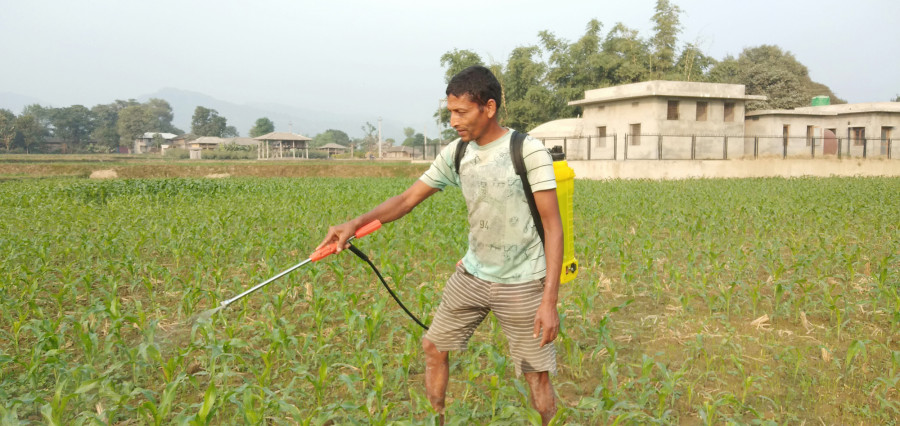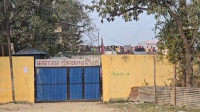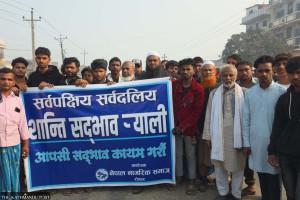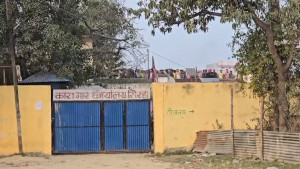Madhesh Province
Fall Armyworm ruin hundreds of bighas of corn fields across Sarlahi
Individual pest control efforts failing for lack of intervention from the state; farmers worry this will affect district’s overall crop output.
Om Prakash Thakur
Every year after paddy harvest, Ram Bahadur Khatri, a corn farmer in Bagmati, Sarlahi, grows corn in a bigha of land. This year, Khatri expanded his cornfield to 1.5 bighas for he had generated good profit with his corn harvest last year.
However, this year he has little hopes of breaking even. His field is riddled with Fall Armyworm, a type of agricultural pest.
According to Khatri, his corn plants were healthy enough to grow well. But, within a week, the plants have started to dry up after swarms of the Fall Armyworms took over his crops. “I purchased some pesticides from the market and sprayed it but that did not have any effect. The pests keep growing in number,” said Khatri.
A majority of farmers who sow corn after harvesting paddy in the western and northern part of the district are facing similar problems.
This harvest season Fall Armyworm has taken over more than a hundred bighas of land in the district, according to local farmers. Bal Kishor Thapa, a resident of Lalbandi, said that pest infestation has already spread to most parts of the district. “I have already sprayed pesticides in corn plants thrice this year but they have failed to work on the pests. The pest is spreading at an alarming rate,” said Thapa. He has cultivated corn plants in two bighas of land this season but is harbouring no hope of a good harvest.
According to agriculture experts, Fall Armyworm (which was first found in America) has been spreading through Africa and Asia since 2016, flying up to 100 km (60 miles) a night. Usually, Fall Armyworm become active at night and feed on crops.
Farmers in Sarlahi say that this is the first time that they have encountered such a problem on such a large scale. Surendra Mahato, a local farmer, said that he has been preparing his field to sow wheat in the hope of recovering from the losses he made with his corn yield this year. He said, “I spent Rs 40,000 while cultivating corn in two bighas of land this season, and now the pests have taken over my field. I’ll try to grow wheat. Hopefully, I’ll grow enough to cover my losses.”
Famers have been commercially cultivating corn in Shankarpur, Rajghat, Janakinagar Pattharkot, Karmaiya, Hajariya, Barhathawa and Murtiya, among other areas.
Farmers bemoaned that the Fall Armyworm also affected paddy plants during the harvesting season this year. Ram Chandra Pandit, a local of Basbariya, said that the pests completely destroyed his stalks of paddy. “Last year, we harvested five to six mann (240kg) of paddy in one Kattha of land. But this season we harvested only three mann (120kg) on the same land. Fall armyworm had destroyed 40 percent of our paddy stalks.”
Although farmers are making individual efforts to control the spread of Fall Armyworm by using pesticides in their fields, it’s far from sufficient. The first case of Fall Armyworm was reported in Ramechhap in August but lack of state intervention even after five months has led to unstoppable damage. “The government has not taken any initiatives against the menace of the Fall Armyworm.” Pandit said, “The outbreak has threatened the overall corn production from the district this year. The government authorities should immediately start “search and destroy” campaigns in the affected areas to control the pest.”
Farmers across the district have been requesting the concerned authority to adopt pest control measures to prevent further destruction of crops. However, the only form of support they have received is from the Agriculture Knowledge Centre in Sarlahi. “We are trying our best to mitigate the damage done by the Fall Armyworm in the district,” said Devananda Raya, chief at the centre. “These insects are most active at night so we have advised the farmers to spray pesticides in the evening for better results,” he said.
Although the farmers are taking preventive measures to control these destructive pests, it is a difficult feat, as the pests carry the ability to multiply and spread at a quick pace, he said. “The state must take this issue seriously. We need to find a permanent solution to this growing problem because this is not just about farmers, it will also reflect on the overall crop output of the district,” said Thapa.




 21.13°C Kathmandu
21.13°C Kathmandu















